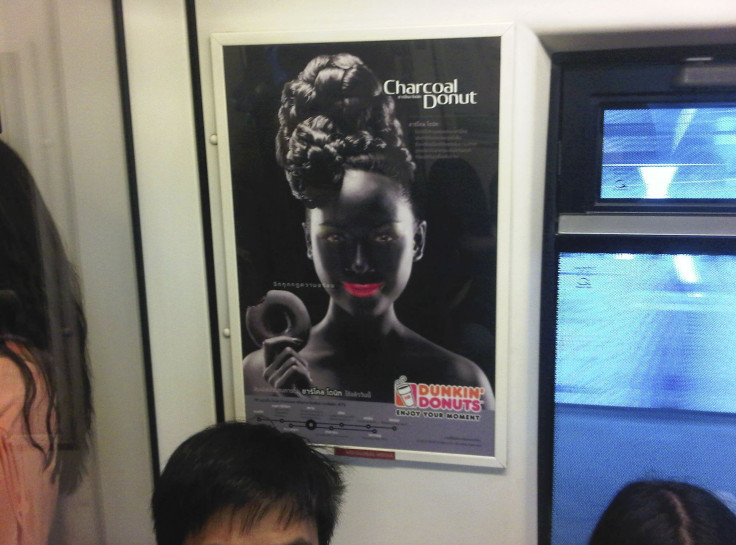
Dunkin' Donuts has recently come under fire after launching a new advertisement campaign in Thailand featuring a smiling woman with bright pink lips in blackface makeup to promote their new "Charcoal Donut." The image is reminiscent of 19th and early 20th century American stereotypes for black people that are now considered offensive symbols of a racist era.
A leading human rights group said it was shocked to see an American brand name running an advertising campaign that would draw "howls of outrage" if released in the United States. Phil Robertson, deputy director of the Asia division of Human Rights Watch, added that it's "rather incredible that an international company like Dunkin' Donuts would run such an ad."
"It's both bizarre and racist that Dunkin' Donuts thinks that it must color a woman's skin black and accentuate her lips with bright pink lipstick to sell a chocolate doughnut," said Robertson. "Dunkin' Donuts should immediately withdraw this ad, publicly apologize to those it's offended and ensure this never happens again."
However, the CEO for Dunkin' Donuts in Thailand dismissed the criticism as "paranoid American thinking." "It's absolutely ridiculous," said CEO Nadim Salhani. "We're not allowed to use black to promote our doughnuts? I don't get it. What's the big fuss? What if the product was white and I painted someone white, would that be racist?"
The sales of the Dunkin' Donuts Thai franchise, which operates independently of the American operation, have increased about 50 percent since the campaign that featured Salhani's teenage daughter as the model, was launched around two weeks ago. Salhani, a Lebanese expatriate in Thailand, said curiosity about the new advertisements helped the business. "Not everybody in the world is paranoid about racism," he said. "I'm sorry, but this is a marketing campaign, and it's working very well for us."
Nevertheless, Karen Raskopf, chief communications officer for Dunkin' Brands, released a statement saying, "Dunkin' Donuts recognizes the insensitivity of this spot and on behalf of our Thailand franchise and our company, we apologize for any offense it caused. We are working with our franchise to immediately pull the television spot and to change the campaign."
The Associated Press reported that the advert had not "ruffled many in Thailand, where it's common for advertisements to inexplicably use racial stereotypes." The news agency said a herbal Thai toothpaste was available with the tagline "it's black, but it's good," while advertising for the Black Man brand of household mops showed a "smiling black man in a tuxedo and bow tie."
© 2025 Latin Times. All rights reserved. Do not reproduce without permission.




